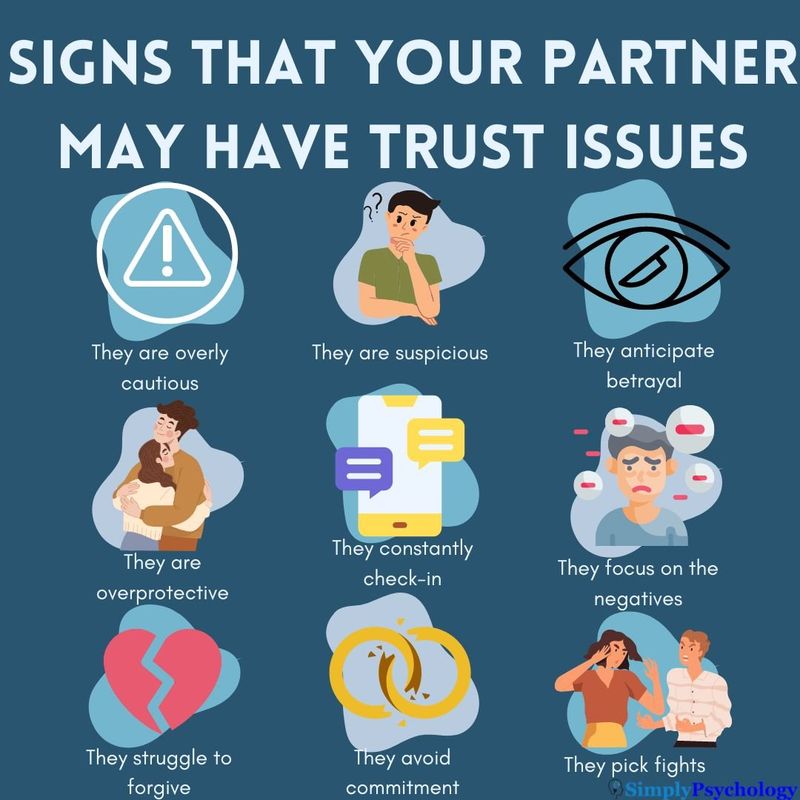19 Possible Reasons Your Partner May Not Find You Attractive Anymore

In a world where relationships are constantly evolving, maintaining attraction can be a complex dance of emotional, physical, and relational factors.
Understanding the reasons why a partner may no longer find us attractive is not about blame, but about clarity and growth. Let’s explore 19 distinct reasons that might silently influence the dynamics of your relationship.
1. Emotional distance is making physical closeness harder

When emotional intimacy feels like a distant memory, physical closeness becomes a challenge. Picture a couple on a couch, lost in their own thoughts, the invisible wall of emotional distance between them. This is more than just a lack of conversation; it’s a gap in understanding, empathy, and connection. The warmth that once drew you together now feels like a cold breeze.
Emotional intimacy is the bedrock of physical attraction. Without it, even the simplest gestures may feel forced or out of place. Ask yourself when was the last time you shared a heartfelt laugh or a meaningful silence. Rebuilding this bridge involves patience, honest communication, and a willingness to explore each other’s emotional landscapes once more.
Consider this a gentle nudge to open up those channels of communication. Like a garden left untended, emotional distance can grow weeds of misunderstanding. Start with small, consistent efforts to reconnect.
2. They feel unappreciated—and it’s changed the vibe

Feeling unappreciated in a relationship is like being invisible in plain sight. Imagine sitting at a table, the once warm meal now cold, symbolic of the warmth that has slowly faded. This feeling of being taken for granted can subtly shift the dynamics between partners, replacing affection with resentment.
When appreciation fades, so does the motivation to nurture the relationship. The energy that once fueled loving gestures and thoughtful surprises dissipates into an unspoken tension. Rediscovering appreciation involves recognizing the small, everyday contributions of your partner, rekindling the spark that first brought you together.
Consider expressing gratitude not just with words, but with actions that show genuine recognition. Sometimes, it’s the little things—a note, a compliment, a shared chore—that speak volumes. Remember, appreciation is a two-way street, and fostering it requires both partners’ commitment to acknowledging and valuing each other’s efforts.
3. Stress is killing their libido (and maybe yours too)

Stress, that silent intruder, can swiftly extinguish the flames of desire. Picture a couple lying in bed, surrounded by piles of unpaid bills and a cluttered room, their minds burdened and bodies fatigued. Stress in its many forms—financial, work-related, or emotional—can create a barrier to intimacy, where even the thought of closeness feels overwhelming.
Recognizing stress as a factor requires empathy and understanding. It’s essential to identify the source of stress and address it collectively. This could mean tackling financial issues together or creating a sanctuary within your home where stressors are left at the door.
Find ways to relax and reconnect, whether through shared activities or simply listening to one another’s concerns. Consider stress management techniques like meditation or exercise, which can alleviate tension and reignite the intimate connection. Remember, a shared burden is a lighter burden, and facing stress together can strengthen your bond.
4. The emotional intimacy has faded

Emotional intimacy, once the heart of a relationship, can dim over time like a candle burning low. Picture a couple at opposite ends of a long dinner table, candles reduced to puddles of wax. The shared glances and inside jokes are replaced with silence, a sign that emotional intimacy has faded.
This loss doesn’t happen overnight—it’s a gradual erosion that leaves partners feeling like strangers. Restoring emotional intimacy requires intentional effort. Engage in activities that allow for deep, meaningful conversations, where vulnerabilities can be shared without judgment.
Rekindle the emotional spark by reminiscing about shared memories or planning future adventures. Small gestures like a handwritten note or a surprise date can reignite the emotional connection. Remember, nurturing emotional intimacy is a continuous journey, not a destination, and it involves both partners actively participating in each other’s emotional lives.
5. Conflict has gone unresolved for too long

Unresolved conflict, like a silent predator, can erode attraction over time. Imagine two people sitting back-to-back on a couch, their gazes fixed on opposite horizons, a living testament to unresolved issues. This unspoken tension can transform affection into frustration, creating an emotional chasm.
Addressing unresolved conflict involves more than just talking—it requires listening. Understanding the root causes of disagreements can pave the way for healing. This might mean setting aside time to openly discuss issues, ensuring each person feels heard and validated.
Consider seeking external help if necessary, such as couples therapy, to facilitate productive communication. The goal is not to win arguments, but to find common ground. Remember, resolving conflict is a process, and it requires patience, empathy, and a willingness to compromise. Repairing this aspect of your relationship can lift the weight of conflict, allowing attraction to flourish once more.
6. They’ve stopped seeing effort—from you or themselves

Effort is the lifeblood of attraction, and when it wanes, so too can the bond between partners. Picture someone gazing into a mirror, surrounded by unused exercise equipment and untouched self-help books, a silent testament to halted efforts.
When one or both partners stop trying, it signals complacency. The enthusiasm that once fueled growth and change gives way to stagnation. Reviving this effort involves recognizing its importance and taking deliberate steps to reignite it. Consider personal goals that foster self-improvement, whether physical, emotional, or relational.
Mutual encouragement can invigorate this process, as partners work together to set and achieve goals. Remember, effort in a relationship is not just about grand gestures; it’s the everyday contributions that keep attraction alive. By investing in yourself and your partner, you breathe life back into the relationship, rediscovering the allure that first drew you to each other.
7. Resentment is quietly replacing attraction

Resentment, like a creeping vine, can silently choke the vitality of attraction. Imagine a couple seated across from each other at a cafe table, their eyes avoiding contact, the air thick with unspoken tension. Resentment can stem from unmet expectations or unresolved grievances, slowly replacing the warmth of attraction.
Identifying and addressing resentment requires courage and honesty. It’s essential to acknowledge these feelings and discuss them openly with your partner. This might involve reflecting on past hurts and seeking ways to forgive and move forward.
Consider framing these discussions around solutions rather than blame, focusing on rebuilding trust and understanding. Remember, resentment left unchecked can become a toxic barrier, but with effort and empathy, it can be transformed into an opportunity for growth. By clearing away resentment, you make space for attraction to thrive once more.
8. One of you has stopped growing—and it shows

When personal growth stalls, it can cast a shadow over a relationship. Picture standing at a crossroads, vibrant paths stretching into the future, yet feeling rooted in place. Growth is vital for both individual fulfillment and relational harmony.
If one partner has stopped evolving, it can create an imbalance, where once aligned goals now diverge. Encouraging growth involves self-reflection and a willingness to embrace change. Consider exploring new hobbies, educational pursuits, or personal challenges that reignite your passion for life.
Nurture each other’s growth by supporting these endeavors and celebrating achievements together. Remember, growth is a personal journey that enriches the relationship. By fostering an environment where both partners can flourish, you create a dynamic and attractive bond that continually draws you closer together.
9. Criticism has become the default setting

When criticism becomes second nature, it can erode the foundation of attraction. Imagine a kitchen scene where one partner points accusatively while the other averts their gaze, the room filled with tension. Habitual criticism can create a defensive atmosphere, stifling affection and closeness.
Breaking this cycle involves cultivating a more positive communication style. Focus on expressing needs and frustrations constructively, using “I” statements to avoid blame. This shift in communication can open doors to understanding and resolution.
Encourage an environment where praise outweighs criticism, where each partner feels valued and supported. Remember, it’s not about ignoring issues, but about approaching them with kindness and empathy. By reducing criticism, you allow attraction to flourish in a more accepting and compassionate space.
10. They’ve changed—and don’t know how to say it

Change is inevitable, but when it’s unvoiced, it can lead to a disconnect in relationships. Picture a person holding a mask in front of their face, standing amidst a bustling street, representing hidden personal transformation. This change might be in values, desires, or life goals, but the fear of sharing can lead to a silent drift.
Acknowledging change requires vulnerability and honesty. It’s important to create a safe space where these shifts can be discussed without judgment. This might mean exploring how these changes impact the relationship and finding ways to align new paths.
Encourage open dialogue that welcomes change as a natural part of personal growth. By understanding and embracing these transformations, you can strengthen the bond, allowing attraction to evolve and adapt. Remember, change doesn’t have to be a divide; it can be a bridge to deeper connection and understanding.
11. The routine has become suffocating

Routine, though comforting, can also become a cage that stifles attraction. Imagine a couple sitting in the same spot in a park day after day, the familiar scene now tinged with monotony. While routines provide stability, they can also dull the excitement and spontaneity that fuel attraction.
Breaking free from a stifling routine requires creativity and willingness to try new things. Consider planning activities that break the mold, whether it’s a spontaneous road trip or trying a new hobby together. These shared experiences can rekindle the excitement and curiosity in your relationship.
Remember, a balance between routine and novelty is essential. By infusing your relationship with fresh experiences, you keep the spark alive, ensuring that attraction remains vibrant and dynamic. Embrace change as an opportunity to grow closer and explore new dimensions together.
12. You’re living like roommates, not partners

When partners start living like roommates, the magic of attraction can fade into the background. Picture a couple in separate rooms, each absorbed in their own activities, the emotional distance palpable. This scenario reflects a loss of connection, where the partnership feels more like coexistence.
Reviving the partnership involves intentional efforts to reconnect and prioritize each other. Consider setting aside dedicated time for shared activities that emphasize togetherness, whether it’s cooking a meal or watching a favorite show.
Understanding and addressing this shift is crucial for rediscovering attraction. Remember, it’s about transitioning from simply sharing a space to actively nurturing a relationship. By focusing on connection, you breathe new life into the partnership, allowing attraction to flourish once again.
13. There’s unspoken disappointment hanging in the air

Unspoken disappointment can hang like a cloud over a relationship, obscuring the light of attraction. Imagine a couple in a quiet cafe, their glances heavy with unsaid words, the air thick with unacknowledged expectations. This silent burden can erode the foundation of affection and closeness.
Addressing unspoken disappointment requires courage and honesty. It’s important to voice expectations and feelings openly, creating a dialogue that allows for understanding and resolution. This might involve reflecting on unmet needs and finding ways to address them collaboratively.
Remember, unspoken disappointment can fester, but with open communication, it can be transformed into an opportunity for growth and reconnection. By clearing the air, you create space for attraction to thrive in a more transparent and supportive environment.
14. They’ve developed a wandering eye (emotionally or physically)

A wandering eye, whether emotional or physical, can cast a shadow over attraction. Picture someone glancing at another across a crowded room while their partner looks away, a silent testament to divided attention. This behavior can signal a search for emotional fulfillment or physical excitement outside the relationship.
Addressing this issue requires open dialogue and trust. It’s essential to understand the underlying reasons for the wandering eye, whether it stems from unmet needs or curiosity. Rebuilding trust involves setting clear boundaries and reinforcing the bond through shared experiences and renewed commitment.
Remember, a wandering eye doesn’t have to spell the end of attraction. With transparency and effort, it can serve as a wakeup call to reinvest in the relationship. By focusing on rebuilding connection and intimacy, you can transform this challenge into an opportunity for deeper attraction and understanding.
15. You’ve both stopped making each other feel special

When partners stop making each other feel special, the vibrancy of attraction can fade. Imagine a couple sitting on a bench, absorbed in their phones, the world bustling around them, a testament to neglect. This lack of attention can erode the connection that once made the relationship unique.
Reviving this aspect involves intentional acts of kindness and thoughtfulness that reignite the feeling of being cherished. Consider making time for surprises, personalized gestures, or simply prioritizing each other’s needs and desires.
Recognize the value of making your partner feel seen and appreciated, as these efforts breathe life into the relationship. Remember, it’s about creating moments that affirm your partner’s importance, ensuring that attraction remains a vibrant and integral part of your shared journey.
16. Trust issues are stealing emotional safety

Trust is the cornerstone of attraction, and when it’s eroded, emotional safety vanishes. Picture someone looking suspiciously at their partner’s phone, a tense expression defining their features. Trust issues can manifest as doubt, suspicion, or a sense of vulnerability that overshadows love.
Addressing trust issues requires honesty and transparency. It’s crucial to identify the root causes of mistrust and work collaboratively to rebuild confidence. This might involve open discussions, setting boundaries, or even seeking external guidance.
Remember, trust is not rebuilt overnight, but with consistent effort and understanding, it can be restored. By fostering an environment of honesty and support, you create a space where attraction can flourish once more, grounded in renewed trust and emotional safety.
17. Body image struggles—yours or theirs—are in the mix

Body image struggles can silently influence attraction, casting a shadow of self-doubt. Picture someone standing before a mirror, their gaze critical and wary, a reflection of internal conflicts. These struggles, whether personal or perceived in a partner, can affect confidence and intimacy.
Addressing body image issues involves fostering a supportive and accepting environment. Encourage open conversations about these feelings, promoting a sense of empathy and understanding. This might involve focusing on health and wellness goals that prioritize well-being over appearance.
Remember, attraction is not solely based on physicality, but on the emotional and relational aspects that bind partners. By nurturing a positive self-image and valuing each other’s inner qualities, you reinforce the foundation of attraction, ensuring it remains robust and enduring.
18. You stopped being curious about each other

Curiosity is the spice of attraction, and when it fades, relationships can become mundane. Picture a couple sitting silently at a dinner table, each absorbed in their thoughts, a testament to lost curiosity. This lack of interest can dull the connection, leading to a stagnant relationship.
Reviving curiosity involves asking questions, exploring new interests together, and rediscovering the nuances that make each other unique. Consider activities that encourage learning and growth, whether through travel, hobbies, or shared challenges.
Remember, curiosity keeps the relationship dynamic and engaging, ensuring attraction remains vibrant. By continuously seeking to understand and appreciate each other anew, you strengthen the bond and fuel the fire of attraction, making it a lasting presence in your shared journey.
19. Intimacy now feels like pressure, not connection

When intimacy feels like pressure rather than connection, the essence of attraction can wane. Picture a couple lying in bed, backs turned, the air heavy with unspoken stress. This scenario reflects a shift where physical closeness becomes an obligation rather than a shared joy.
Addressing this requires understanding and patience. It’s crucial to discuss these feelings openly, exploring the root causes without judgment. Foster an environment where intimacy is a choice, not a demand, and where each partner feels comfortable expressing their needs and boundaries.
Remember, intimacy thrives on mutual respect and desire. By focusing on emotional connection and ensuring both partners feel valued and understood, you can transform pressure into genuine connection, revitalizing the attraction that binds you together.
